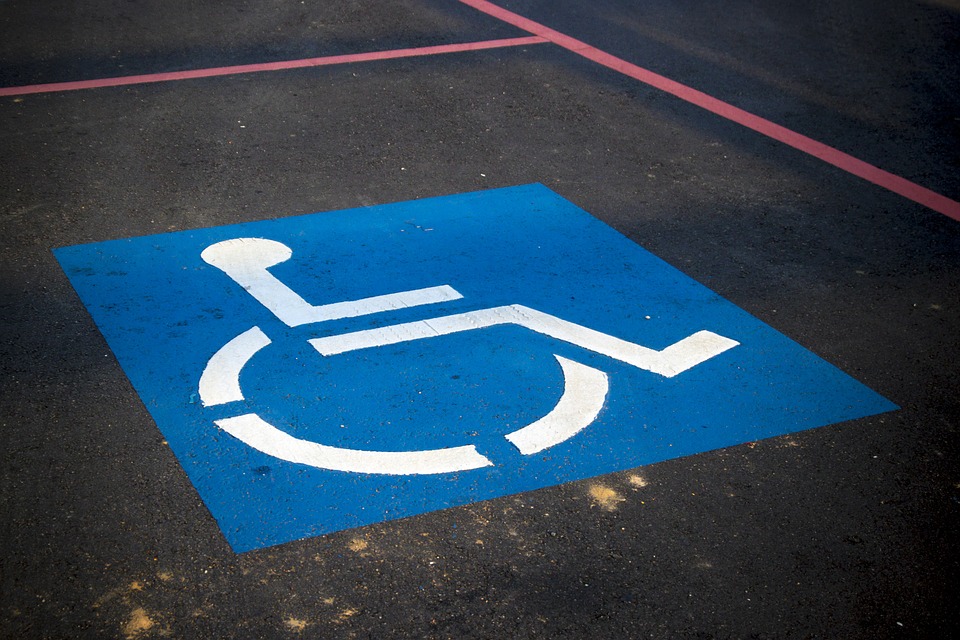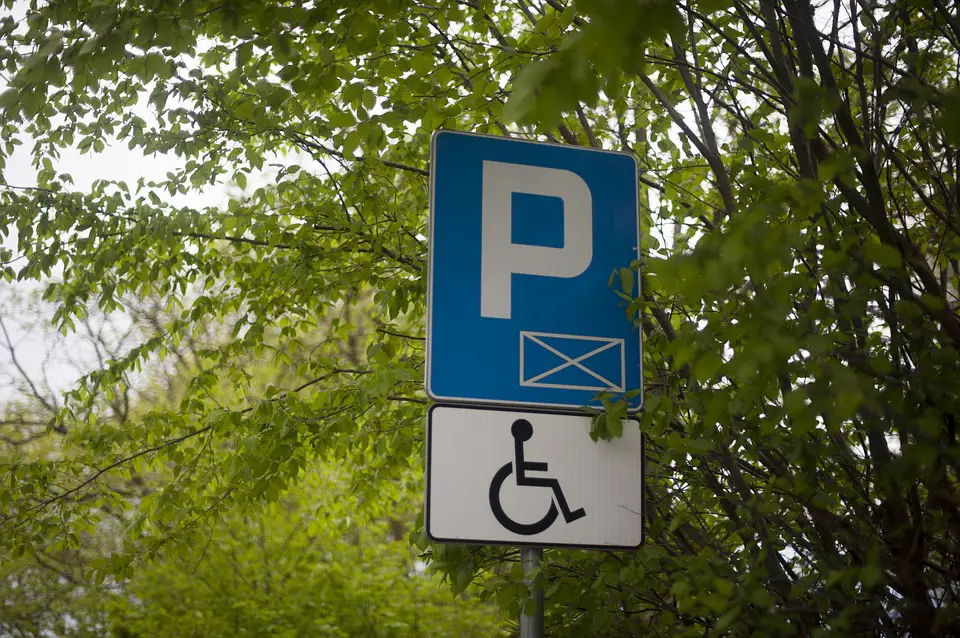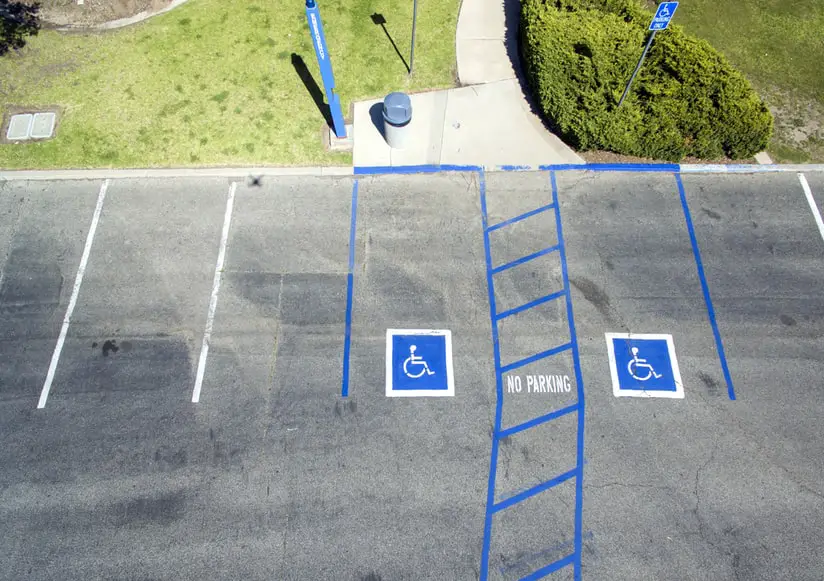It is rare to find parking lots without a reserved area for people with disabilities to park their vehicles.
These spots are easily identified by a white symbol drawing of a wheelchair on a blue metal board erected in front of the reserved space.
The symbols are found at grocery stores, event centers, schools, hospitals, and restricted parking areas. The creation of these reserved spaces reduces the plights of persons who may be disadvantaged in parking lots because of their disabilities.
However, there seems to be a high rate of abuse of these parking spaces.
There are specific people reserved with the right to use the spaces. They include people with external disabilities, internal health issues, and transporters of handicapped persons.
Table of Contents
- Categories of People Who Can Park in Disabled Spaces
- Types of Handicapped Parking Spaces
- Misuse of Disability Plate License or Placards
Categories of People Who Can Park in Disabled Spaces
1) People with External Disabilities
People using crutches, wheelchairs, prosthetic legs or arms, or other mobility aids fall into this category. If the vehicle owner is the one with the disability, a specially marked license plate will be issued to the owner.
But in cases where the disabled person boards another vehicle, they will have to hang a disability placard on the rearview mirror to enable the driver to park the vehicle in the restricted area.
The criteria for determining people with external disabilities vary from state to state. The kind of disability a person has will also determine the type of permits the state will issue to the person. A visually impaired or deaf person may be issued only a disability placard. And if the disability is temporal, then the person will be issued a renewable temporal disability card.
Recommended: Complete Guide on Choosing Disabled Clothing for Wheelchair Users
2) People with Internal Health Issues
Over time, there has been a disregard for people whose disabilities are not visible to the eyes. Such include breathing difficulties, lung and kidney failure, psychological and mental problems, and other health challenges that aren’t easily noticeable.
Depending on the type of health challenge, persons may be issued both a disability card and a special license plate or only a disability placard. Whichever way, you should not deny them the right to park in handicapped spaces.
However, various states prioritize certain disabilities, such as people with severe physical disabilities, because of the limited parking spaces allocated to the disabled.
3) Transporters of Handicapped Persons
Family, friends, and cab drivers driving handicapped persons are also allowed to park in handicapped places. However, the vehicles used to transport handicapped persons should have a disability badge hung on the rearview mirror. Also, the disabled person’s presence in the vehicle is necessary to validate the disability badge usage at any point in time.
Recommended: Best Disabled Cabins on Cruise Ships
Types of Handicapped Parking Spaces
There are three common types of handicapped parking spaces.

1) Standard Handicap Parking Space
This type of parking space is designed to accommodate cars without lifts or wheelchair ramps. It has an aisle beside it which is about 5 feet wide and leads to an access ramp. The aisle is designed to allow easy movement of wheelchairs, walkers, and other devices that aids movement.
2) Handicap Parking Space for Vans (One Entry)
This type of parking space is similar to the standard parking space. The major difference is the width of the parking space and the aisle. The aisle is about 8 feet wide and also leads to an access ramp. This type of parking space is meant for vans conveying handicapped persons, especially those using wheelchairs.
3) Handicap Parking Space for Vans (Two Entries)
This type is simply a modification of the one entry handicap parking space for vans. In this case, there are two entries accessible from both sides of the vans leading to an access ramp for easy movement into the building.
These types of parking spaces are designed to serve slightly different purposes. The standard handicap parking space is for vehicles (vans inclusive) that do not require a ramp or lift for the occupant to alight or board the vehicle. The handicap parking space for vans is for vans (or any other vehicle) with a ramp or lift. As a driver, you must park in a parking space suitable for the kind of vehicle you are driving.
Recommended: Wheelchair Accessible Vehicle: Best Cars for Carrying Wheelchairs
Misuse of Disability Plate License or Placards

There’s been a wide misuse of disability permits. It comes in various forms, such as lending the permit to non-handicapped persons, using expired permits, forging the doctor’s signature on permits, and stealing permits.
1) Lending to Non-Handicapped Persons
Lending disability permits to non-handicapped persons is a punishable offense. Both the lender and the borrower can be fined, with the lender risking having the permit revoked. This kind of misuse is usually by family members of handicapped persons who want to take advantage of handicapped spaces in public parks.
2) Using Expired Permits
Both temporal and permanent disability placards are renewable. While the validity of temporal placards could be between 3 to 12 months, permanent placards could be up to 10 years. The validity period varies from state to state and, in some cases, can be influenced by a doctor, especially in temporal disabilities.
However, the renewal processes are usually at little or no cost, depending on your state, to ensure users renew their permits when due.
3) Forging of Doctor’s Signature
Before a disability permit is issued to anyone, the applicant must submit reports from a doctor attesting to their disability claim. Some non-disabled people have begun forging documents and doctors’ signatures to secure a permit. This unlawful practice has prevented handicapped persons from accessing handicapped spaces at parks.
4) Stealing of Disability Permits
Stealing of disability permits comes in various forms. It can be using a deceased family member’s permit or outrightly snatching the placard from a vehicle conveying a handicapped person. Using a dead person’s disability permit to park in handicapped spaces can attract a fine.
Other abuses of disability permits include forging permits, illegal extension of the permit’s expiry date, and obtaining permits without following due process. Anyone guilty of these is not allowed to park in a handicapped space.




